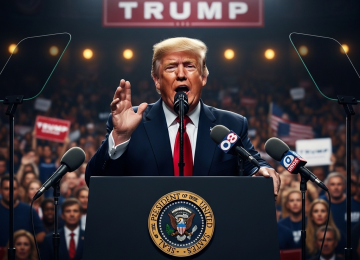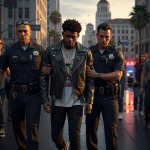5 DNC Speaker Predictions for the Upcoming Convention
The Democratic National Convention is more than just a formality to nominate a presidential candidate; it’s a four-day spectacle of political messaging, strategy, and star-making. Central to this spectacle is the keynote address, a prime-time slot that can catapult a relatively unknown politician into the national spotlight. The role of the keynote dnc speaker is to energize the base, frame the election’s stakes, and introduce the party’s vision for the future to the American people. History has shown us the power of this position—a little-known state senator from Illinois named Barack Obama became a household name after his 2004 address. As the next convention approaches, speculation is rampant about who will be chosen to fill these very large shoes. Here are our top five predictions for who might take the stage.

The Rising Star Governor: A Fresh Voice
One of the most common choices for a keynote speaker is a popular governor from a key state. Governors can speak from a position of executive experience, showcasing tangible results and a forward-looking agenda that has already been tested. They represent a blend of pragmatism and vision that often resonates with a broad audience. This year, the party has several compelling options.
A governor like Gretchen Whitmer of Michigan or Wes Moore of Maryland fits this mold perfectly. They are dynamic leaders from critical states who have navigated complex political landscapes and have a story to tell about rebuilding and progress. A governor as the keynote speaker can make the case that the party’s policies aren’t just theoretical—they are actively working to improve lives at the state level. Their message often centers on:
- Economic Development: Highlighting job growth, infrastructure projects, and investments in new technology.
- Social Progress: Championing reproductive rights, voting access, and education.
- A Contrast in Leadership: Drawing a sharp line between their collaborative, results-oriented governance and the perceived chaos of the opposition.
Choosing a rising star governor is a strategic move to signal that the party is focused on the future and has a deep bench of talented leaders ready for the national stage. It sends a message of competence and vitality.
The Legislative Powerhouse as a DNC Speaker
While a governor brings executive experience, a legislative leader from Washington D.C. offers a different kind of authority. A prominent senator or a high-ranking member of the House of Representatives can speak with deep knowledge about the national issues at the heart of the campaign. They are in the trenches of the legislative battles and can articulate the party’s accomplishments and goals with precision and passion. The ideal DNC speaker from Congress would be someone known for their sharp debate skills and their ability to distill complex policy into a compelling narrative.
Figures like House Minority Leader Hakeem Jeffries or a charismatic Senator like Raphael Warnock could be powerful choices. They can effectively prosecute the case against the opposing party while laying out a clear, positive agenda. Their speech would likely focus on the legislative victories of the past few years, such as the Inflation Reduction Act or the Bipartisan Infrastructure Law, framing them as promises kept. This choice signals stability, seriousness, and a deep understanding of the levers of power in Washington. It’s a way of telling the American people that the party has the experience and know-how to govern effectively.

The Unconventional Pick: Shaking Things Up
Sometimes, the best move is the one nobody sees coming. An unconventional choice for the keynote speaker can generate immense buzz and capture the attention of voters who might otherwise tune out. This could be a dynamic mayor from a major city, a celebrated activist, or even a compelling private citizen whose life story embodies the party’s core values. The goal of this high-risk, high-reward strategy is to break through the noise of a typical political convention and create a viral, memorable moment.
Think of someone like Mayor Brandon Johnson of Chicago or a prominent gun control activist. This person might not have a traditional political resume, but they have a powerful, authentic story that connects with everyday Americans on an emotional level. As reported by sources like the Associated Press, which covers political conventions extensively, these moments can define the narrative. The speech would be less about policy details and more about values, struggle, and hope. It’s a gamble, but if it lands, an unconventional dnc speaker can energize specific segments of the electorate—especially younger voters and independents—who are often cynical about traditional politics.
The pros of this choice are clear: authenticity and new energy. The cons are a potential lack of polish and the risk that the message doesn’t fully align with the broader campaign’s strategy. However, in an era of social media and short attention spans, a raw, powerful moment can be more effective than a perfectly polished political speech.
The Next-Generation Leader
Looking to the future is a perennial theme of political conventions. What better way to embody this than by selecting a young, charismatic leader to deliver the keynote? This choice is explicitly about passing the torch and showcasing the party’s next generation. This individual would likely be a younger member of Congress or a state-level official who has already made a national name for themselves through their passionate advocacy or viral moments of legislative debate.
Someone like Maxwell Frost, the first Gen Z member of Congress, would be a bold and exciting choice. His presence on stage would be a powerful symbol of generational change. His speech would connect with younger voters on issues they care about deeply, from climate change and gun violence to student debt and economic opportunity. A next-gen speaker can bring an entirely different energy and perspective, using social media savvy and contemporary language to make the party’s platform feel relevant and urgent to a demographic that is crucial for victory. This choice is an investment in the party’s long-term health and a declaration that it is ready to embrace the leaders of tomorrow.

The “Unity” Candidate
In a deeply polarized country, sometimes the most powerful message is one of unity. This final prediction centers on choosing a DNC speaker whose profile is built on bipartisanship and a willingness to work across the aisle. This could be a politician from a purple or even red state who has a proven track record of winning over independent and moderate Republican voters. The choice of a “unity” speaker is designed to appeal to the exhausted majority of Americans who are tired of partisan bickering.
This speaker wouldn’t deliver a fiery, red-meat speech. Instead, their tone would be more measured and aspirational, focusing on shared values and common goals. They would talk about patriotism, community, and the importance of finding common ground to solve the nation’s biggest problems. This strategy aims to expand the party’s tent and persuade swing voters that the Democrats are the party of reason and reconciliation. While it may not excite the progressive base as much as other choices, it could be the most effective strategy for winning a close general election. The ultimate decision will reveal much about the party’s strategy and its vision for the path forward.















